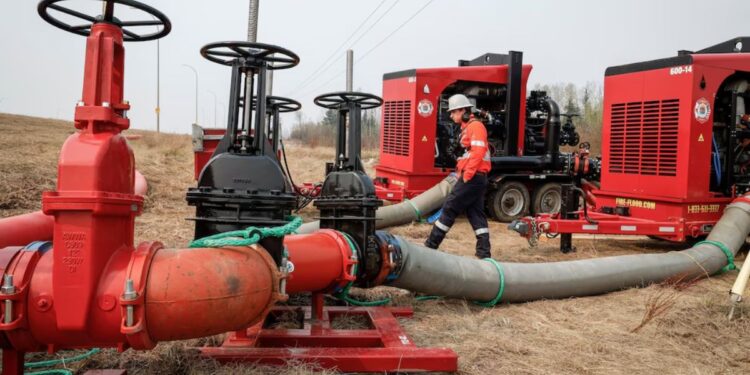The wildfire in Fort McMurray, Alberta, which has displaced thousands of residents, was contained on Thursday thanks to the arrival of rain and cooler temperatures.
According to Christie Tucker, the provincial wildfire information officer in Alberta, the fire has not grown in size and is currently at 200 square kilometers (77 square miles). Despite being designated as an out-of-control fire, there has been no overnight growth.
According to Tucker, a spokesperson at a news conference in Edmonton, the majority of the province will experience rain and cooler temperatures this week. However, it is unfortunate that the northern part of the province is expected to remain dry and warm.
The fire stayed approximately 6 kilometers (3.7 miles) away from the southwest outskirts of the community, and it was less than five kilometers (3 miles) from the main highway south.
According to Alberta Wildfire Information Officer Josee St.-Onge, the rain will dampen things.
Crews in Fort McMurray were greeted with light rain, overcast skies, and cooler temperatures when they woke up.
Sandy Bowman, the mayor of the regional municipality of Wood Buffalo that encompasses Fort McMurray, expressed optimism about the current trajectory, stating, “With the assistance of favorable weather conditions, I am highly hopeful that we are moving in the right direction.”
Residents who have been evacuated from their homes will likely have to wait until at least next Tuesday before they can return. The evacuation alert still remains in effect for the rest of the city and neighboring subdivisions.
The Albertan city had already experienced a similar situation before. In 2016, a devastating fire swept through the city, resulting in the destruction of 2,400 homes and the displacement of over 80,000 residents.
Fires in various parts of western Canada have also led to the evacuation of residents from their homes.
In northeastern British Columbia, the evacuation area around Fort Nelson, a town of 4,700 people, continued to expand. As of Wednesday evening, the evacuation zone had reached approximately 127 square kilometers (49 square miles). The BC Wildfire Service expressed hope that the situation could improve with the forecast of light rain and cooler temperatures, which may help prevent the fire from advancing closer to the town.
Around 500 individuals are still unable to return to the remote northwestern community of Cranberry Portage in Manitoba. However, officials have reported that the fire in the area is approximately 80% contained, giving hope that residents may be able to go back home by the upcoming weekend.










